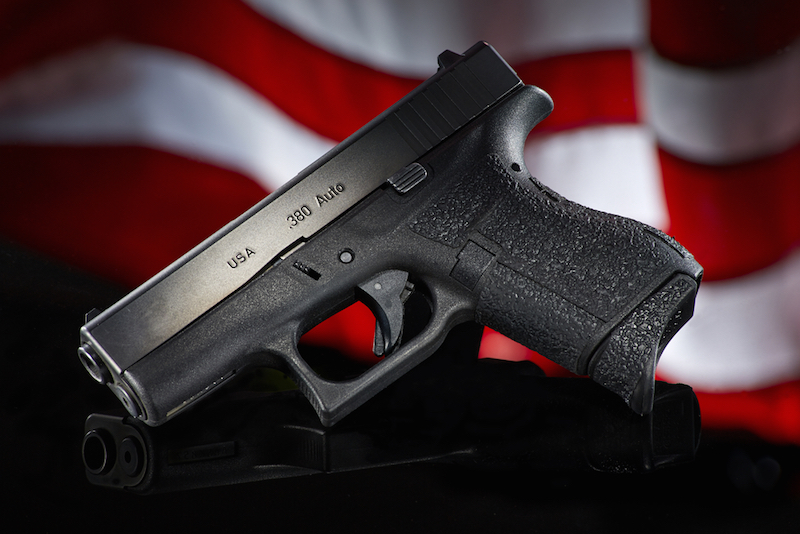Federal Gun Research Still Stalled

Get the world’s most fascinating discoveries delivered straight to your inbox.
You are now subscribed
Your newsletter sign-up was successful
Want to add more newsletters?

Delivered Daily
Daily Newsletter
Sign up for the latest discoveries, groundbreaking research and fascinating breakthroughs that impact you and the wider world direct to your inbox.

Once a week
Life's Little Mysteries
Feed your curiosity with an exclusive mystery every week, solved with science and delivered direct to your inbox before it's seen anywhere else.

Once a week
How It Works
Sign up to our free science & technology newsletter for your weekly fix of fascinating articles, quick quizzes, amazing images, and more

Delivered daily
Space.com Newsletter
Breaking space news, the latest updates on rocket launches, skywatching events and more!

Once a month
Watch This Space
Sign up to our monthly entertainment newsletter to keep up with all our coverage of the latest sci-fi and space movies, tv shows, games and books.

Once a week
Night Sky This Week
Discover this week's must-see night sky events, moon phases, and stunning astrophotos. Sign up for our skywatching newsletter and explore the universe with us!
Join the club
Get full access to premium articles, exclusive features and a growing list of member rewards.
Just hours before a mass shooting in San Bernardino, California, left 14 dead Wednesday (Dec. 3), the group Doctors for America, which advocates for changes in the health care system, petitioned Congress to end the federal ban on gun violence research.
It may have been a confusing request for many Americans — after all, President Barack Obama ordered an immediate end to the ban after the 2012 shooting at Sandy Hook Elementary School. Shouldn't the Centers for Disease Control and Prevention (CDC) and the National Institutes of Health (NIH) be using federal funds to study the problem by now?
As it turns out, Obama's order did little to end the freeze, even though the original author of the funding ban now says it was never intended to stifle all federal gun research. [How the Government Stifled Gun Research]
Dickey Amendment
The federal freeze on gun research dates back to 1996, when Jay Dickey, then a U.S. congressman from Arkansas, introduced the so-called Dickey Amendment, which states that funds made available to the CDC may not "be used to advocate or promote gun control."
The Dickey Amendment passed in response to a 1993 study published in The New England Journal of Medicine that found that having a gun in the home increased the risk of homicide in that home, according to the American Psychological Association. In response to the study, the National Rifle Association lobbied to shut down the CDC's National Center for Injury Prevention, which had funded the study.
Dickey's amendment didn't explicitly ban gun research, and it kept the Center for Injury Prevention alive. But Congress simultaneously took $2.6 million from the CDC's budget — a number that was not coincidentally the exact amount the agency had spent on gun-related research the year before. As far as the CDC was concerned, the message was clear: Do gun research, lose funding.
Get the world’s most fascinating discoveries delivered straight to your inbox.
"Precisely what was or was not permitted under the clause was unclear," gun violence researchers Frederick Rivara and Arthur Kellermann wrote in The Journal of the American Medical Association in 2013. "But no federal employee was willing to risk his or her career or the agency's funding to find out."
In fact, after an NIH-funded study in 2009 found that carrying a gun is not protective against being shot in an assault, Congress expanded the language of the Dickey Amendment to apply it to all Department of Health and Human Services agencies, Rivara and Kellermann wrote.
Sandy Hook's aftermath
After the Sandy Hook elementary school shooting in Newtown, Connecticut, in which a gunman killed six adults, 20 children and himself, Obama reversed the gun research ban by executive order and announced he would push for $10 million in the CDC budget for 2014 earmarked for gun research. Public health researchers were thrilled.
But Congress failed to act. Twice, Obama asked for $10 million in funding in the federal budget for gun violence research. And twice, the House of Representatives quietly turned down the request. Without money allocated specifically to gun research, federal agencies have not been able to launch funding programs for gun research. (There are some agencies not constrained by the Dickey Amendment. The Department of Justice issued a call for research proposals on gun violence reduction early this year, and the agency does fund some research on gun violence. The money available through that grant totals only $1.5 million, however.)
"I've been studying this subject for a number of years now,and I don't think I've ever seen a call to fund research on stopping mass shooters, which seems a little surprising, given the political rhetoric about the need to do so," Adam Lankford, a professor of criminal justice at the University of Alabama, told Live Science.
Even the author of the original amendment is unhappy with the current research freeze. Dickey told NPR in October that he'd never intended all gun research to end; he just wanted to prevent "the collection of data so that they can advocate gun control." He said the current Congress should reinstate funding for gun violence research.
Editor's Note: This article was update with additional information from a professor of criminal justice.
Follow Stephanie Pappas on Twitter and Google+. Follow us @livescience, Facebook & Google+. Original article on Live Science.

Stephanie Pappas is a contributing writer for Live Science, covering topics ranging from geoscience to archaeology to the human brain and behavior. She was previously a senior writer for Live Science but is now a freelancer based in Denver, Colorado, and regularly contributes to Scientific American and The Monitor, the monthly magazine of the American Psychological Association. Stephanie received a bachelor's degree in psychology from the University of South Carolina and a graduate certificate in science communication from the University of California, Santa Cruz.
 Live Science Plus
Live Science Plus










